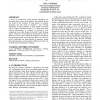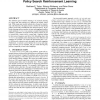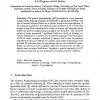443 search results - page 48 / 89 » Learning from a Population of Hypotheses |
ECCV
2004
Springer
14 years 11 months ago
2004
Springer
We present a probabilistic framework for recognizing objects in images of cluttered scenes. Hundreds of objects may be considered and searched in parallel. Each object is learned f...
ML
2006
ACM
13 years 9 months ago
2006
ACM
The application of Inductive Logic Programming to scientific datasets has been highly successful. Such applications have led to breakthroughs in the domain of interest and have dri...
GECCO
2007
Springer
14 years 4 months ago
2007
Springer
A series of evolutionary neural network simulations are presented which explore the hypothesis that learning factors can result in the evolution of long periods of parental protec...
ATAL
2007
Springer
14 years 4 months ago
2007
Springer
The ambitious goal of transfer learning is to accelerate learning on a target task after training on a different, but related, source task. While many past transfer methods have f...
EVOW
1994
Springer
14 years 2 months ago
1994
Springer
The genetic programming (GP) paradigm is a new approach to inductively forming programs that describe a particular problem. The use of natural selection based on a fitness ]unction...



